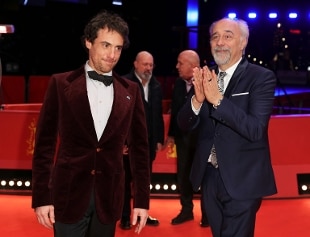- Berlinale: three Italian films, directed by Ferrara, Rights and the D'Innocenzo, among the 18 competing
Share
February 22, 2020 "I just wanted to hide" by Giorgio Rights, in competition for Italy last night at the Berlin Film Festival and in theaters from February 27, is exactly as expected: a classic film, philologically flawless and with added value by Elio Germano as a syncopated Ligabue full of artistic grunts. Not only that, the Emilian director also paid great attention to the biography of the painter, always grappling with his madness, and then many reassuring images of landscapes, nature and animals.Among the many difficulties of Germano, who played the role of Antonio Costa known as Ligabue, also that of dealing indirectly with the historical and unforgettable interpretation of Flavio Bucci, who had just passed away, who had played in 1977 the naive painter in a TV series in three episodes signed by Salvatore Nocita.
Who was Ligabue also known in Italy as 'El Tudesc'? Affected by gout, rickets, psycholiability and subject to attacks of fury so violent as to require psychiatric hospitalization several times, he was the son of an Italian woman who migrated to Switzerland. Entrusted then to a local couple, with whom he matures relationships of love and hate, at a certain point Ligabue finds himself attacking his adoptive mother so much that he is expelled from Switzerland. Thus he finally arrives in Italy, in Gualtieri in the province of Reggio Emilia, where he initially lives like a bum among a thousand hardships on the banks of the Po. It is here that he really begins to paint, especially animals such as lions, jaguars, gorillas and tigers, but on one background of screeching, that of the poplars and the quays of the river Po. And it is still here that he meets the sculptor and painter Renato Marino Mazzacurati who introduces him to the world of art.
In the film, in addition to the accurate reconstruction of the period, there is the skill of Elio Germano especially in telling this child artist both in the misfortune and in the late success. And it is then that Ligabue, now the subject of exhibitions and compliments, flaunts childishly to have a car with driver, a collection of beloved motorcycles. And he does it with those women who almost always deny him a kiss. "Each of us is a little Ligabue - says the director at Ansa -, his story of emotional deficiencies and his struggle to exist unites us to him, to this man who has fought so hard to be happy. - continues Rights - is that it was a different one and in this crazy artistic dimension there was all his desire for redemption ". However, he concludes: "I told everything by reconstructing that era as best I could so that this character could move as in a bitter fairy tale".
For Elio Germano, in competition in Berlin also with "Favolacce" by the D'Innocenzo brothers, no identification of too much: "I always try to detach myself from the characters I play - he says - and in 'I wanted to hide' the difficult thing was the length of the make-up and the atmosphere of the sets. I had to wear two or three pairs of trousers and as many jackets. I didn't see anything about Bucci's Ligabue - he just tried to clean up, to approach the character in a virgin way ". Who was Ligabue? "A man who was more comfortable with animals - Germano concludes - and who was struggling to put up even two words. Fortunately he knew how to express himself with painting and giving shape to mud".

